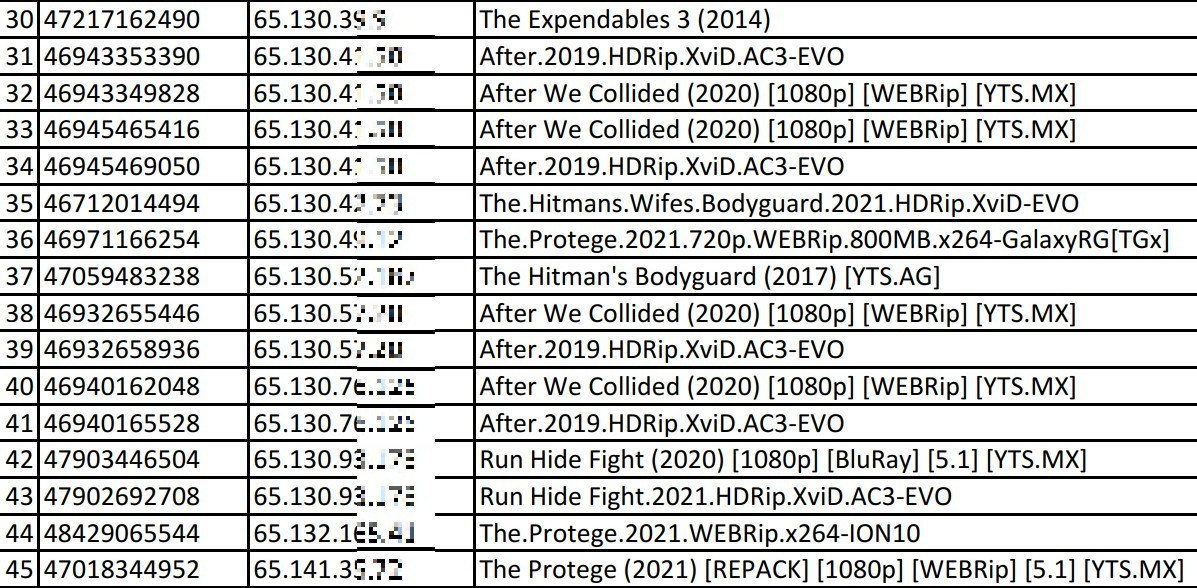Tracking BitTorrent pirates is relatively easy since IP addresses are broadcasted publicly. With help from Internet providers, these addresses can then be linked to an account holder.
ISPs don’t hand over this data voluntarily, however; they typically require a subpoena or court order to take action.
In the United States, these subpoenas are obtained by filing a copyright complaint in federal court against a “John Doe” who’s known only by an IP address. Most of these cases are filed against a single person which makes it a relatively expensive process.
The filing fee for these cases is over $400 with no guarantees that this money will be recouped in the end. The fact that new lawsuits continue to be filed suggests that it’s worth it, but rightsholders are also trying alternative routes.
Filmmakers Target 63 IP-addresses
A few days ago, a group of film companies tied to well-known movies such as “After We Collided”, “Tesla”, “The Expendables 3” and “The Protege”, requested a DMCA subpoena at the federal court of Hawaii. The legal paperwork targets Centurylink and comes with a long list of 63 IP addresses, some of which downloaded multiple films.
The goal of the subpoena request isn’t to pursue a copyright claim in court, as we see with traditional BitTorrent lawsuits. Instead, the film companies will likely use the information to offer a direct settlement to the alleged pirates.
This is a relatively cheap shortcut as large groups of pirates can be combined in one request, for which the total filing fee is under $50. In addition, these subpoenas are not reviewed by a judge and only require a signature from the court clerk.
In recent years we have occasionally seen these requests pop up. Initially, these attempts failed, in part due to jurisprudence that was established following the RIAA’s mass lawsuits nearly two decades ago.
Clever but Controversial Shortcut?
The RIAA’s legal campaign was aimed to make pirates feel vulnerable so targeting large groups of file-sharers was a must. To save costs, the RIAA, therefore, used DMCA subpoenas to identify the alleged infringers.
ISPs were not happy with this trend and objected. They argued that DMCA subpoenas are only valid when an Internet service stores or links to the infringing content, not when they merely pass on traffic.
Various courts have agreed with ISPs since and effectively banned the practice in the early 2000s. If copyright holders want to go after alleged pirates, they have to file a complaint and request a regular subpoena, the message was.
The filmmakers who requested the subpoenas last week are aware of the jurisprudence. However, attorney Kerry Culpepper argues that the Ninth Circuit Appeals Court, which Hawaii falls under, never ruled on the ‘mere conduit’ issue in a case like this. Hence, it’s an open question.
In fact, the attorney argues that more recent decisions suggest that the subpoenas may apply in these instances. For example, in repeat infringer cases against ISPs such as Cox and Grande, courts have concluded that DMCA notices are valid and apply to conduit providers.
This argument has to be tested in court but, for now , Internet provider Centurylink doesn’t seem inclined to challenge it. This means that the personal information of the affected subscribers will be handed over to the movie companies.
Warned
While the use of DMCA subpoenas against pirating subscribers is relatively rare, the filing rate and the number or targeted subscribers is growing.
Earlier this year, filmmakers already requested Centurylink to hand over information on 13 alleged pirates, and not much later another DMCA subpoena targeted an additional 40 subscribers. That number has now gone up to 63.
For the affected subscribers the allegations shouldn’t come as a complete surprise, as they have all been targeted by piracy notifications in the past.
In the most recent filing, there’s one IP address that received a dozen ‘warnings’ for pirating “The Protege” in the span of a month. Another IP address received six warnings, all for different films.
Whether these cases will indeed lead to settlements will remain unknown. Now that the subpoena is granted, there will be no further updates through the court. However, we expect that the account holders will be asked to pay damages, ranging from a few hundreds dollars, to potentially thousands.
—
A copy of the DMCA subpoena request is available here and the issued subpoena can be found here


 Tracking BitTorrent pirates is relatively easy since IP addresses are broadcasted publicly. With help from Internet providers, these addresses can then be linked to an account holder.
Tracking BitTorrent pirates is relatively easy since IP addresses are broadcasted publicly. With help from Internet providers, these addresses can then be linked to an account holder. 




